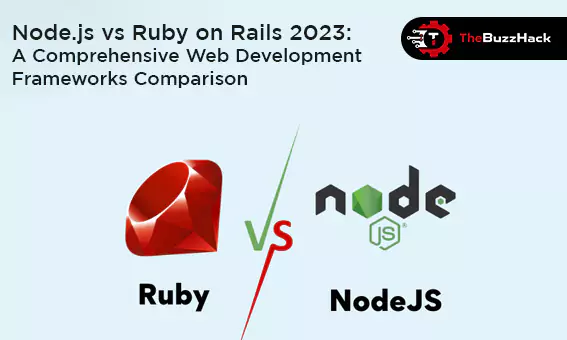
Node.js vs Ruby on Rails 2023: A Comprehensive Web Development Frameworks Comparison
In the realm of web development in 2023, the choice between Node.js and Ruby on Rails (RoR) is pivotal. This blog post aims to dissect these frameworks, evaluating factors such as capabilities, performance, community support, and suitability for modern web development. Whether you’re considering Ruby on Rails development services or exploring Node.js, this comparison will guide you toward an informed decision.
Explained: Node.js and Ruby on Rails
When it comes to web development, the loading times of Node.js and Ruby on Rails are notably swift compared to other languages. Both languages differ in features, performance, hosting, and programming languages.
Overview of Node.js
Node.js, built on Chrome’s V8 engine, facilitates server-side execution of JavaScript code. Its event-driven, non-blocking architecture is renowned for scalability and high-performance capabilities. With an extensive ecosystem of libraries, Node.js offers flexibility and efficiency for web application development.
Overview of Ruby on Rails
Ruby on Rails, also known as RoR or Rails, is a full-stack web development framework utilizing the Ruby programming language. Following the Model-View-Controller (MVC) pattern, Rails emphasizes convention over configuration. It excels in providing a standardized approach to building web applications, making it a sought-after choice for web development services.
Application Architecture for Ruby on Rails
Ruby on Rails adheres to the MVC architectural pattern, dividing the application into three components:
Model
The Model handles data and business logic, interacting with the database. ActiveRecord, an Object-Relational Mapping (ORM) framework, is commonly used for creating models.
View
Responsible for presenting data to users, the View manages the user interface using embedded Ruby (ERB) templates for HTML views. Partials and layouts enhance code reusability.
Controller
Intermediary between Model and View, the Controller processes user requests, interacts with models, and determines the views to render. It handles routing, request processing, and business logic flow, promoting separation of concerns.
Application Architecture for Node.js
Node.js doesn’t enforce a specific architecture but provides flexibility:
Single-Page Applications (SPAs)
Node.js serves as a server-side API for SPAs, where client-side frameworks handle rendering views and user interactions.
Microservices Architecture
Node.js excels in building microservices, dividing applications into independent services efficiently communicating through APIs.
Server-Side Rendering (SSR)
Node.js can render HTML on the server, enhancing initial page loads and SEO. Frameworks like Next.js and Nuxt.js provide SSR capabilities.
Event-Driven Architecture
Node.js’s event-driven nature suits real-time applications, chat services, and streaming. Express.js and Socket.IO are often leveraged for routing and real-time communication.
Node.js vs Ruby on Rails: A Comprehensive Understanding
Understanding the key benefits of both frameworks is crucial for informed decision-making in web development. This guide, crafted by our expert developers, offers insights for those considering Ruby on Rails and Node.js.
Development Speed and Productivity
Ruby on Rails prioritizes developer productivity with a convention-based approach, pre-built components, and a rich ecosystem of libraries and gems. Node.js, with a unified language across the stack, lacks Rails’ built-in conventions, potentially resulting in a steeper learning curve.
Performance and Scalability
Node.js excels in high-performance scenarios with its event-driven, non-blocking I/O model. Ruby on Rails, while not inherently as performant, provides a solid foundation for scalability with caching mechanisms and performance optimization techniques.
Community and Ecosystem
Node.js boasts a larger community and the extensive NPM ecosystem, offering a broad range of modules. Ruby on Rails, though with a slightly smaller community, features a mature ecosystem and a culture of open-source contributions, with a rich collection of gems.
Learning Curve and Documentation
Ruby on Rails is considered beginner-friendly with well-structured documentation and abundant tutorials. Node.js may pose challenges for beginners due to the need for a deeper understanding of JavaScript and asynchronous programming.
Use Cases and Industry Adoption
Node.js excels in real-time applications, microservices, and APIs, with widespread adoption by companies like Netflix, Uber, and LinkedIn. Ruby on Rails thrives in rapid development scenarios, finding applications in e-commerce, social networking, and content management systems, utilized by companies like GitHub, Airbnb, and Shopify.
Last Words
Both Node.js and Ruby on Rails have distinct strengths suitable for different use cases. Node.js offers scalability, high performance, and a vast ecosystem, making it ideal for real-time applications and APIs. Ruby on Rails emphasizes productivity and convention-over-configuration, finding its niche in industries like e-commerce and social networking.
When deciding between the two frameworks, consider your project’s requirements, the need for Ruby on Rails developers’ skills, and the long-term goals of your application. Whether opting for the convention-driven approach of Ruby on Rails or the flexibility of Node.js, both frameworks stand as reliable choices for web development in 2023.
For expert advice and development services, connect with our consultants at Purgesoft. Whether hiring Ruby on Rails developers or exploring Node.js, Purgesoft provides solutions tailored to your business needs.
Read More: Essential Components of SaaS Development


